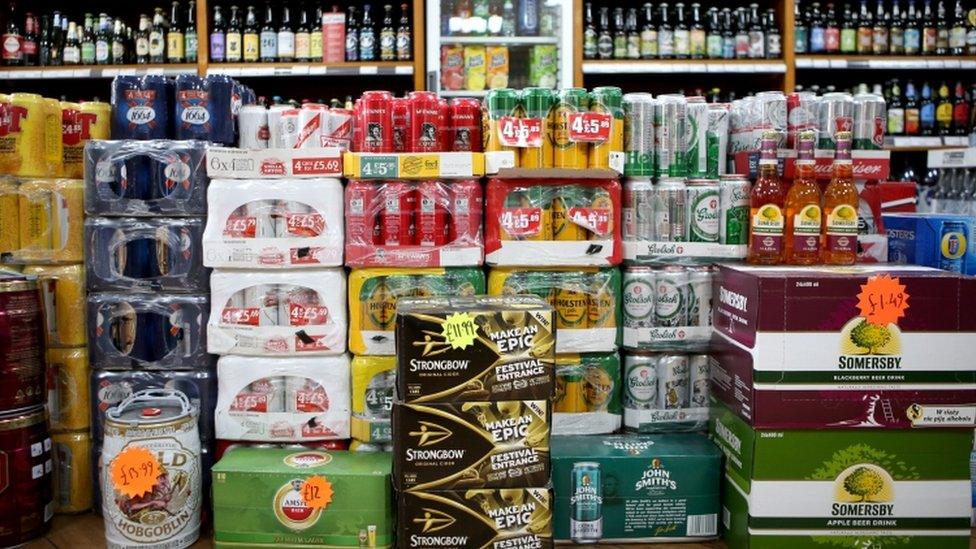Poorest 'suffer most' from easy local access to alcohol
- Published

Minimum pricing for alcohol will be introduced from 1 May
Scotland's poorest people suffer most from having easy access to alcohol in their area, a new study has suggested.
Researchers at Glasgow and Edinburgh universities found those on the lowest incomes were more likely to drink too much if availability was high.
They have suggested the Scottish government should take an overview at the number of shops selling alcohol - particularly in areas of low income.
The Scottish government said it was determined to tackle alcohol abuse.
The study found the amount of alcohol consumed by people on the highest incomes was far less affected by the number of outlets near their homes.
The findings comes ahead of the introduction of minimum pricing for alcohol on 1 May.
The move will raise the cost of the strongest, cheapest alcohol by setting a minimum price per unit - which the Scottish governments want to be 50p.
The government views the measure as a key weapon in the battle against binge drinking, with people in Scotland said to buy 20% more alcohol on average than those in England and Wales.
The researchers argued that that radical policy changes were needed to address health inequalities in alcohol-related harm
A team from Edinburgh and Glasgow universities studied links between alcohol consumption and income for the latest report.
Researchers said the results could be driven by factors including low-income groups spending more time in their local areas and being more reliant on these neighbourhoods.
They combined data on the density of alcohol outlets in town and cities across the country with details from a national health survey of more than 28,000 people.
The team's findings suggested that interventions to reduce drinking which focus exclusively on consumer behaviour - such as media campaigns and warning labels on bottles and cans - were unlikely to make significant improvements to health.
They argued that radical policy changes were needed to address health inequalities in alcohol-related harm. Changes, they said, should include reducing the availability of alcohol.
The team has shown previously that there are more premises selling alcohol in the poorest parts of Scotland than in the wealthiest areas.
They also highlighted that the poorest areas have the highest levels of consumption and alcohol-related harm.
'Heavy drinkers'
Dr Niamh Shortt, of the University of Edinburgh's School of GeoSciences, said: "Reducing alcohol-related harm is a key public health priority and Scotland is leading the way with the implementation of a minimum unit price. There is, however, more to be done.
"Low-income groups suffer most from alcohol-related harm, and our research shows that they are also at the greatest risk from its ubiquitous availability in our neighbourhoods.
"Alongside price, we need to address the easy availability of alcohol."
The Scottish government highlighted the progress it is has made in tackling alcohol misuse, including the minimum unit pricing policy, and said it was "determined to go further".
A spokesman added: "We recognise that excessive daily and weekly consumption is common across different age, gender and socio-economic groups, although we know that the greatest harm is experienced by those who live in the most deprived areas.
"We will be refreshing our alcohol strategy shortly and our focus is on implementing minimum unit pricing in May which will target heavy drinkers as they tend to drink the cheap, high strength alcohol that will be most affected by the policy."
The study is published in the journal Annals of the American Association of Geographers. It was funded by The European Research Council and the Scottish Collaboration for Public Health Research and Policy.